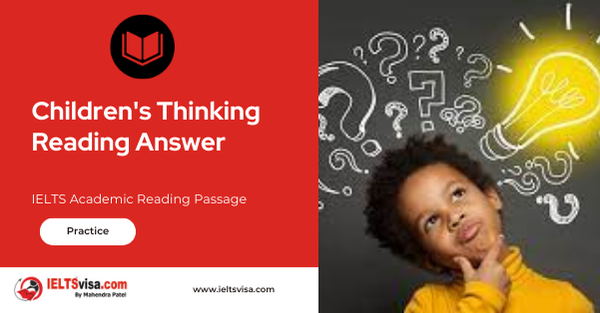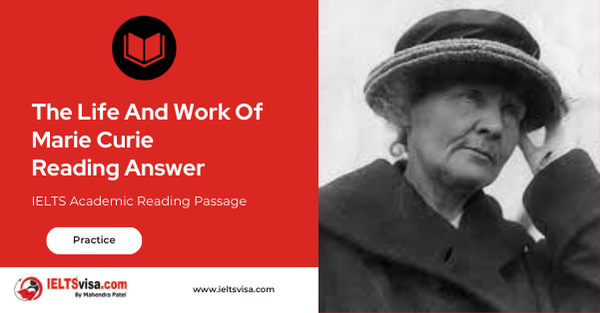Children's Thinking Reading Answer
IELTS Academic Reading Passage
One of the most eminent of psychologists, Clark Hull, claimed that the essence of reasoning lies in the putting together of two ‘behaviour segments’ in some novel way, never actually performed before, so as to reach a goal.
Two followers of Clark Hull, Howard and Tracey Kendler, devised a test for children that was explicitly based on Clark Hull’s principles. The children were given the task of learning to operate a machine so as to get a toy. In order to succeed they had to go through a two- stage sequence. The children were trained on each stage separately. The stages consisted merely of pressing the correct one of two buttons to get a marble; and of inserting the marble into a small hole to release the toy.
The Kendlers found that the children could learn the separate bits readily enough. Given the task of getting a marble by pressing the button they could get the marble; given the task of getting a toy when a marble was handed to them, they could use the marble. (All they had to do was put it in a hole.) But they did not for the most part ‘integrate’, to use the Kendlers’ terminology. They did not press the button to get the marble and then proceed without further help to use the marble to get the toy. So the Kendlers concluded that they were incapable of deductive reasoning.
The mystery at first appears to deepen when we learn, from another psychologist, Michael Cole, and his colleagues, that adults in an African culture apparently cannot do the Kendlers’ task either. But it lessens, on the other hand, when we learn that a task was devised which was strictly analogous to the Kendlers’ one but much easier for the African males to handle.
Instead of the button-pressing machine, Cole used a locked box and two differently coloured match-boxes, one of which contained a key that would open the box. Notice that there are still two behaviour segments — ‘open the right match-box to get the key’ and ‘use the key to open the box’ – so the task seems formally to be the same. But psychologically it is quite different. Now the subject is dealing not with a strange machine but with familiar meaningful objects; and it is clear to him what he is meant to do. It then turns out that the difficulty of ‘integration’ is greatly reduced.
Recent work by Simon Hewson is of great interest here for it shows that, for young children, too, the difficulty lies not in the inferential processes which the task demands, but in certain perplexing features of the apparatus and the procedure. When these are changed in ways which do not at all affect the inferential nature of the problem, then five- year-old children solve the problem as well as college students did in the Kendlers’ own experiments.
Hewson made two crucial changes. First, he replaced the button-pressing mechanism in the side panels by drawers in these panels which the child could open and shut. This took away the mystery from the first stage of training. Then he helped the child to understand that there was no ‘magic’ about the specific marble which, during the second stage of training, the experimenter handed to him so that he could pop it in the hole and get the reward.
A child understands nothing, after all, about how a marble put into a hole can open a little door. How is he to know that any other marble of similar size will do just as well? Yet he must assume that if he is to solve the problem. Hewson made the functional equivalence of different marbles clear by playing a ‘swapping game’ with the children. The two modifications together produced a jump in success rates from 30 per cent to 90 per cent for five-year-olds and from 35 per cent to 72.5 per cent for four-year-olds. For three-year- olds, for reasons that are still in need of clarification, no improvement—rather a slight drop in performance – resulted from the change.
We may conclude, then, that children experience very real difficulty when faced with the Kendler apparatus; but this difficulty cannot be taken as proof that they are incapable of deductive reasoning.
Questions 1-8
Classify the following descriptions as a referring
Clark Hull CH
Howard and Tracy Kendler HTK
Micheal Cole and colleagues MC
Simon Hewson SH
Write the appropriate letters in boxes 1-8 on your answer sheet.
NB You may use any answer more than once.
1. is cited as famous in the field of psychology.
2. demonstrated that the two-stage experiment involving button-pressing and inserting a marble into a hole poses problems for certain adults as well as children.
3. devised an experiment that investigated deductive reasoning without the use of any marbles.
4. appears to have proved that a change in the apparatus dramatically improves the performance of children of certain ages.
5. used a machine to measure inductive reasoning that replaced button-pressing with drawer-opening.
6. experimented with things that the subjects might have been expected to encounter in everyday life, rather than with a machine.
7. compared the performance of five-year-olds with college students, using the same apparatus with both sets of subjects.
8. is cited as having demonstrated that earlier experiments into children’s ability to reason deductively may have led to the wrong conclusions.
Questions 9-13
Do the following statements agree with the information given in Reading Passage?
In boxes 9-13 on your answer sheet write
YES if the statement agrees with the information
NO if the statement contradicts the information
NOT GIVEN if there is no information on this in the passage
9. ………………… Howard and Tracey Kendler studied under Clark Hull.
10…………………. The Kendlers trained their subjects separately in the two stages of their experiment, but not in how to integrate the two actions.
11. ……………….. Michael Cole and his colleagues demonstrated that adult performance on inductive reasoning tasks depends on features of the apparatus and procedure.
12. ……………….. All Hewson’s experiments used marbles of the same size.
13. …………………. Hewson’s modifications resulted in a higher success rate for children of all ages.

Solution:Children’s Thinking Reading Answer
| 1. CH | 8. SH |
| 2. MC | 9. NOT GIVEN |
| 3. MC | 10. YES |
| 4. SH | 11. YES |
| 5. SH | 12. YES |
| 6. MC | 13. NO |
| 7. SH |
Review and Practice
- Regularly practice with IELTS reading samples and time yourself to get used to the pressure of the exam.
- Review your mistakes to understand where you went wrong and how to avoid similar errors in the future.
Our Books
Master IELTS Speaking Part 1
IELTS Writing Task 1 Book
IELTS Writing Task 2 Book
Children's Thinking Reading Answer Explanation
Comin Soon
Practice IELTS Other Modules
IELTS Listening
The IELTS Listening test assesses how well you can understand spoken English in various contexts. It lasts about 30 minutes and is divided into four sections with a total of 40 questions. The listening tasks become increasingly difficult as the test progresses.
IELTS Academic Reading
The IELTS Academic Reading section assesses your ability to understand and interpret a variety of texts in academic settings. It is designed to evaluate a range of reading skills, including skimming for gist, reading for main ideas, reading for detail, understanding inferences, and recognizing a writer's opinions and arguments.
IELTS Speaking
The IELTS Speaking test assesses your ability to communicate in English on everyday topics. It lasts 11-14 minutes and consists of three parts: introduction, cue card, and a discussion based on the cue card topic.
IELTS General Reading
IELTS General Reading tests your ability to understand and interpret various types of texts. Here are some key areas and types of content you can expect to encounter in the reading section, along with tips for effective preparation.
IELTS Academic Writing Task 1
In IELTS Academic Writing Task 1, you are presented with a visual representation of information, such as graphs, charts, tables, or diagrams, and you are required to summarize, compare, or explain the data in your own words.
IELTS General Writing Task 1
In IELTS General Writing Task 1, you are required to write a letter based on a given situation. The letter can be formal, semi-formal, or informal, depending on the prompt. Here’s a breakdown of the key components to include in your letter
IELTS Academic Writing Task 2
In IELTS Academic Writing Task 2, you are required to write an essay in response to a question or topic. Here’s a guide to help you understand the essential elements of this task
IELTS Exam Tips
To succeed in the IELTS exam, practice regularly, familiarize yourself with the test format, improve your vocabulary, develop time management skills, and take mock tests to build confidence.
Grammer for IELTS
Grammar is the foundation of effective communication in English. Understanding tense usage, subject-verb agreement, and sentence structure enhances clarity and coherence in writing and speaking.
Vocabulary for IELTS
Vocabulary plays a crucial role in the IELTS (International English Language Testing System) exam, especially in the Speaking and Writing sections. Here’s an overview of why vocabulary is important and how it impacts your performance
RECENT IELTS SAMPLES QUESTIONS AND ANSWERS
The Life And work Of Marie Curie Reading Answer
Marie Curie is probably the most famous woman scientist who has ever lived. Born Maria...
Becoming An Expert Reading Answer
A Expertise is commitment coupled with creativity. Specifically, it is the commitment of...
STUDY CENTRE COURSES Reading Answer
SELF-STUDY TIPS AHowever difficult you find it to arrange your time, it will pay off in the...
The Extrinct Grass In Britain Reading Answer
A The British grass interrupted brome was said to be extinct, just like the Dodo. Called...
Morse Code Reading Answer
A. A new satellite-based system is being implemented to replace Morse code for sending...
Magnetic Therapy Reading Answer
AMagnetic therapy, which is a $5-billion market worldwide, is a form of alternative medicine...













